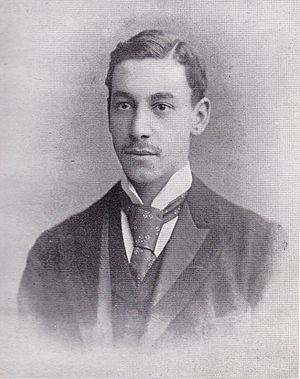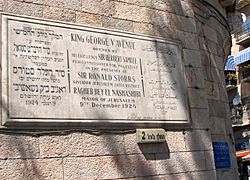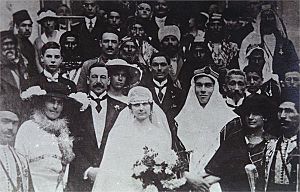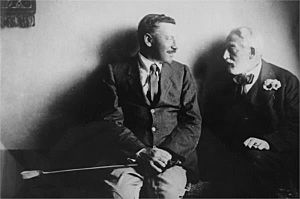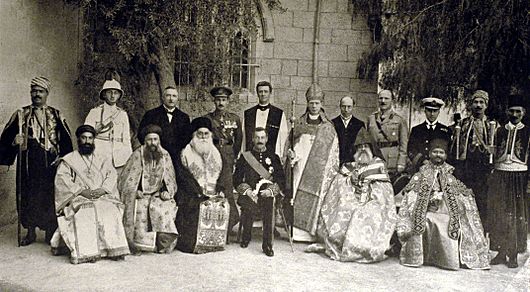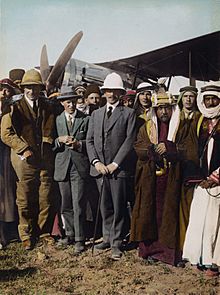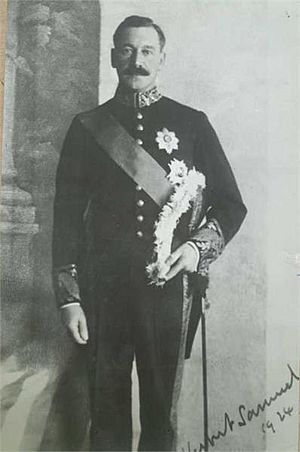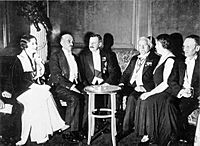Herbert Samuel, 1st Viscount Samuel facts for kids
Quick facts for kids
Herbert Samuel
|
|
|---|---|
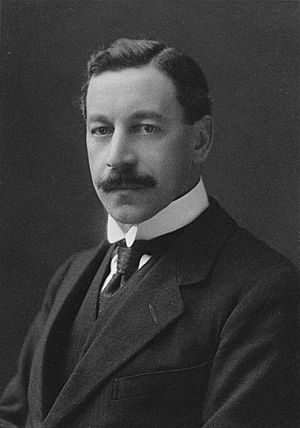 |
|
| Leader of the Liberal Party | |
| In office 4 November 1931 – 26 November 1935 |
|
| Preceded by | David Lloyd George |
| Succeeded by | Archibald Sinclair |
| 1st High Commissioner for Palestine | |
| In office 1 July 1920 – 30 June 1925 |
|
| Preceded by | Position created |
| Succeeded by | Sir Herbert Plumer |
| Home Secretary | |
| In office 26 August 1931 – 1 October 1932 |
|
| Prime Minister | Ramsay MacDonald |
| Preceded by | John Robert Clynes |
| Succeeded by | Sir John Gilmour, Bt |
| In office 12 January – 7 December 1916 |
|
| Prime Minister | H. H. Asquith |
| Preceded by | Sir John Simon |
| Succeeded by | Sir George Cave |
| Postmaster-General | |
| In office 26 May 1915 – 18 January 1916 |
|
| Prime Minister | H. H. Asquith |
| Preceded by | Sir Charles Hobhouse |
| Succeeded by | Joseph A. Pease |
| In office 14 February 1910 – 11 February 1914 |
|
| Prime Minister | H. H. Asquith |
| Preceded by | Sydney Buxton |
| Succeeded by | Sir Charles Hobhouse |
| Member of Parliament for Darwen |
|
| In office 30 May 1929 – 14 November 1935 |
|
| Preceded by | Frank Sanderson |
| Succeeded by | Stuart Russell |
| Member of Parliament for Cleveland |
|
| In office 5 November 1902 – 14 December 1918 |
|
| Preceded by | Alfred Pease |
| Succeeded by | Park Goff |
| Personal details | |
| Born | 6 November 1870 Toxteth, Liverpool, Lancashire, England |
| Died | 5 February 1963 (aged 92) London, England |
| Political party | Liberal |
| Spouse | Beatrice Franklin |
| Children | Edwin Philip Godfrey Nancy |
| Alma mater | Balliol College, Oxford |
Herbert Louis Samuel (born November 6, 1870 – died February 5, 1963) was an important British politician. He was a member of the Liberal Party and led it from 1931 to 1935.
He was the first person of Jewish faith to become a Cabinet minister in the British government. He was also the first High Commissioner for Palestine, a very important job in the 1920s. Samuel worked to bring in new social reforms when he was a Liberal minister.
Contents
Early Life and Education
Herbert Samuel was born in Toxteth, Liverpool, England, in 1870. His family had moved to Britain from Poland around 1775. His uncle, Samuel Montagu, was a famous banker.
Herbert went to University College School in London and then to Balliol College, Oxford. Even though he had a Jewish upbringing, he decided not to follow any religion when he was at Oxford. However, he stayed part of the Jewish community to please his wife. He also followed some Jewish traditions at home for health reasons.
Starting His Political Career
Samuel tried to become a Member of Parliament twice before he was finally elected in 1902. He joined the Liberal Party.
In 1909, he became a member of the Cabinet, which is a group of the most important ministers in the government. He held several important jobs, including Chancellor of the Duchy of Lancaster, Postmaster General, and later Home Secretary.
During World War I, Samuel suggested that Britain should take control of Palestine. This idea later influenced the Balfour Declaration, which supported the idea of a Jewish homeland in Palestine. As Home Secretary, he helped create laws to encourage Russian refugees to join the British Army or return to Russia for military service.
In 1916, the Prime Minister, H. H. Asquith, was replaced by David Lloyd George. Samuel chose to leave his job as Home Secretary.
Supporting Women's Rights
At first, Samuel did not support giving women the right to vote. But he later changed his mind. In 1918, he proposed a motion to allow women to become Members of Parliament. This idea passed with a large majority, and a law was quickly made. This meant women could stand for election in the 1918 general election.
High Commissioner for Palestine
Why Palestine Was Important
In 1914, Samuel met Chaim Weizmann, who would later become the first President of Israel. Samuel was already very interested in Zionism, which is the movement to create a Jewish homeland. In 1915, he wrote a paper called The Future of Palestine. In it, he suggested that Britain should take control of Palestine. He believed it could become a home for Jewish people. He also said that non-Jewish people must be treated equally.
Becoming High Commissioner
After World War I, Britain took control of Palestine. Samuel was appointed as the first High Commissioner for Palestine in 1920. This was before the League of Nations officially gave Britain the job of governing Palestine. He held this important position until 1925. Samuel was the first person of Jewish faith to govern the historic Land of Israel in 2,000 years.
He made Hebrew one of the three official languages of the area. His appointment was a bit controversial. Some people, especially Arabs, were worried that a Jewish leader would favor Jewish people too much. They feared it would lead to a "Zionist national home" against their wishes. However, Samuel tried to be fair to everyone.
His Time in Office
As High Commissioner, Samuel tried to find a balance between the interests of Jewish people and Arab people. He tried to slow down Jewish immigration and gain the trust of the Arab population. He wanted Arabs to be involved in governing the area. But he would not let them stop Jewish immigration or land purchases.
He chose Haj Amin al Husseini as the chief Islamic spiritual leader. Samuel was also respected by the Jewish community. He was honored by being called to read from the Torah at the Hurva synagogue in Old City of Jerusalem.
During his time, the Churchill White Paper was published. This paper supported Jewish immigration as long as the country could support them. It said the Jewish national homeland was about developing the existing Jewish community. It was not about forcing a Jewish nationality on everyone in Palestine.
Samuel was known for being fair. He helped sign a land agreement with Bedouin tribes, giving them state land. Historians still debate Samuel's role in Palestine. Some Zionists think he weakened the idea of a Jewish homeland. Some Arab nationalists see him as part of an alliance between Zionism and British rule. But many believe both views are mistaken.
Later Political Career
Samuel returned to the British Parliament in 1929. In 1931, he became the deputy leader of the Liberal Party. He led the party when David Lloyd George was ill.
He served as Home Secretary again in the National Government led by Prime Minister Ramsay MacDonald. However, the government wanted to introduce new taxes on imports, called tariffs. This caused problems for the Liberal Party, which did not support tariffs. Samuel and the Liberal ministers eventually resigned from the government in 1932. In 1933, they officially became an opposition party. Samuel remained the leader of the Liberal Party until he lost his seat in Parliament in 1935.
In 1937, he was given the title Viscount Samuel. Later, he supported Prime Minister Neville Chamberlain's policy of appeasement towards Adolf Hitler. This policy aimed to avoid war by giving in to some of Hitler's demands. Samuel even suggested that Germany should not be blamed for World War I and should get back its colonies.
He helped the Kindertransport movement in 1938. This movement brought refugee children from Europe to safety in Britain.
Samuel later became the leader of the Liberal Party in the House of Lords (1944–1955). In 1951, he made history by being the first British politician to give a party political broadcast on television.
Family Life
In 1897, Herbert Samuel married his cousin, Beatrice Miriam. They had three sons and one daughter. His son, Edwin, served in the Jewish Legion. Herbert Samuel was also the great-uncle of the famous scientist Rosalind Franklin, who helped discover the structure of DNA.
Writing and Ideas
In his later years, Samuel wrote books about science and philosophy. He was interested in the future of humanity. His books included Essays in Physics (1951) and In Search of Reality (1957).
Images for kids
See also
 In Spanish: Herbert Louis Samuel para niños
In Spanish: Herbert Louis Samuel para niños
- Liberalism in the United Kingdom
- Pro-Jerusalem Society - Herbert Samuel was its Honorary President


